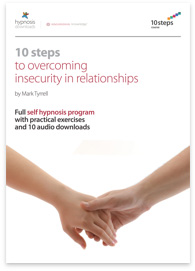No Strings on Me: Is There a Psychopath in Your Life?
 "Psychopaths don't usually look like those in the movies, and knowing how to spot one is a vital life skill"
"Psychopaths don't usually look like those in the movies, and knowing how to spot one is a vital life skill"I've got no strings
So I have fun
I'm not tied up to anyone
They've got strings
But you can see
There are no strings on me!
- 'I've got no strings', from Walt Disney's Pinocchio
Ever been toyed with by a psychopath? Conned? Manipulated? Ever dated or been married to one? Worked for one? Voted for one? Perhaps you've even been attacked by one? Maybe you just know one?
Chances are the answer is yes to one of these questions, whether you realize it or not.
The scientific consensus is that one in a hundred people is psychopathic, and this breaks down evenly between men and women.1 At the very least, you must have brushed shoulders with one in the street.
Scary thought? Well here's another question.
What comes to mind when you hear the word 'psychopath'? A serial killer? A crazy person foaming at the mouth? Norman Bates?
Think again.
The muddied waters of movie madness
Hollywood loves psychopaths because they make such wonderful (or terrible) baddies. Often, though, the psychotic and the psychopath are confused or conflated.
Perhaps the most famous 'mad' movie baddie of them all, Norman Bates in Alfred Hitchcock's Psycho, is regularly branded a psychopath. But he was no such thing.
Norman Bates was a delusional psychotic. 'Hearing voices' or 'seeing things' that aren't there can be symptoms of psychotic illnesses like schizophrenia, but are not characteristic of psychopathy.
Of course, schizophrenia itself is another condition often misrepresented in the movies, which pursue the dramatic possibilities of 'split personality' yet fail to acknowledge that this is not a feature of schizophrenia at all.2
To see a more accurate portrayal of a psychopath, turn to the eponymous stone-cold hired assassin 'the Jackal' in The Day of the Jackal, or the scheming and manipulative Tom Ripley in The Talented Mr Ripley.
They don't hear voices or act crazy. They are 'bad' rather than 'mad'. They are cold, calculating, glib, and ruthless. But even they aren't necessarily representative of the psychopaths hidden in plain sight within the social fabric of our lives.
In reality, most psychopaths are not criminal (although many criminals are psychopaths)3 - but they are certainly amoral.
So how do you tell if there is a psychopath in your life?
What exactly is a psychopath?
Psychopaths may wear a mask of normality. This means they can be highly plausible, charming, and at least superficially likeable and admirable. Until you really get to know them, that is.
We often hear the terms sociopath and psychopath used interchangeably, although there may be a degree of difference.
'Socialized psychopaths', sometimes called 'successful psychopaths', can be hard to spot. They don't seem obviously dangerous and they won't necessarily end up in jail. They may even seem nice and caring! Dr Harold Shipman was very highly respected before it came to light that he had killed hundreds of his patients.
If we don't know how to recognize that there's a problem with someone, by the time we do see what's really going on it may be too late. It can be hard to even believe what they've said or done behind your back because they "seemed so nice!"
Some psychologists distinguish between psychopaths and sociopaths. Both psychopathy and sociopathy meet many of the same diagnostic criteria and lie within the spectrum of antisocial personality disorders, but some clinicians feel there is a distinction between them.
The psychopath tends to be more patient and better able to control their behaviour than their close cousin the sociopath. The sociopath is easier to spot; they may not be able to rein in their impulses and are likely to have more run-ins with the law.4
But maybe you have worried that you yourself are psychopathic.
Psychopathy sits on a sliding scale.
If you are worried about being a psychopath yourself, you very likely are not one. I've worked as a psychotherapist for 25 years, and I have never had a client come for help with overcoming psychopathy. True psychopaths tend not to care whether they are 'good people'. They may even revel in being bad.
But as with all human behaviour, there does seem to be a continuum. People can be more or less psychopathic. We may have all displayed occasional traits. Those who score really highly in 'the psychopath test' tend to be, not surprisingly, more potentially dangerous to those around them in all sorts of ways.
If you want to take a validated psychopath test you can do so here. Bear in mind that this is not going to give you a professional diagnosis. But it does highlight how psychopathy stretches across a line of traits, with some people being more or less psychopathic than others.
So what traits should you be looking out for?
Do you know anyone like this?
Psychopaths experience life differently and also behave differently. Lets have a look at this in more detail.
Psychological traits of psychopaths
- Lack of empathy for other people (though psychopaths in particular may be excellent at feigning care for others)
- Lack of regard for other people's rights or feelings
- Lack of attachment to and responsibility for other people; superficiality when it comes to relationships
- Lack of remorse: people's bad feelings and problems are their problem, even if the psychopath caused them
- Lack of feelings of guilt or responsibility for situations
- Fearlessness and sometimes impulsivity
- A view of the world and people as instrumental - there for the taking (if you can be used they will use you; if not, they may be uninterested)
- Self absorption and narcissism; a grandiose sense of entitlement and a feeling that others should worship them unconditionally (there may be an overlap between psychopathy and narcissistic personality disorder)
- Lack of self-consciousness or genuine embarrassment or shame; supreme self-confidence even in the absence of experience and knowledge.
Behavioural traits of psychopaths
- Distinctive speech patterns. A study of psychopathic prisoners found that they used words relating to food, sex, and money twice as often as non-psychopathic prisoners.5 They were also less likely to refer to themselves when describing their crimes, so not "I shot him" but "he got shot" - almost as though someone else had done it.
- Superficial charm and glibness. The psychopath may present as likeable, funny, and confident. They might be skilled in using flattery to push your buttons. Of course, people can be all these things without being psychopathic, but these behaviours can nonetheless be indicative of the Machiavellian psychopath.
- A disregard, blatant or subtle, for laws and social norms which apply to other people ("no strings on me!"), who are mugs for complying. Some people may find this recklessness attractive, feeling drawn to the intoxicating rebelliousness of the psychopath.
- Sexual promiscuity.
- Lying and deceitfulness. 'Successful psychopaths' are especially likely to use Machiavellian manipulation and play people off against one another.
- An inclination to use violence if necessary (though this is more commonly a trait of the sociopath).
- Fearlessness and inability to adapt behaviour even after punishment. Psychopaths tend not to 'learn their lesson'.
Some of these characteristics seem pretty extreme, but remember, a psychopath may be really good at deflecting blame and appearing virtuous.
Psychopathy seems pretty resistant to treatment or punishment,6 and there do seem to be neurological differences in the brains of psychopaths.7 This indicates that psychopathy to some extent is probably 'hardwired', although environmental influences may partly determine whether or not the psychopath becomes violent or criminal.
Not surprisingly, socialized psychopaths often shoot to the top of organizations. Being ruthless and calm under fire and knowing how to manipulate others can quickly get you where you want to go. Having a socialized psychopath on your side (such as in battle) may be a real benefit. But when you are the one they have in their sights, you're in trouble.
So why can we so easily be sucked in by the psychopath?
Charisma meets cruelty
The socialized psychopath can be very attractive for the very qualities that make them psychopathic. This is not as contradictory as it sounds. A person whom we sense is not encumbered with the same inhibitions, doubts, uncertainties, and sensitivities that plague the rest of mankind can seem very attractive. They can have such an aura of confidence and freedom about them.
They may be enormously fun, sensation-seeking risk takers. There are "no strings" on them - or so it would appear. They may even seem like charismatic heroes to us. And they will keep us onside while we are useful to them. If you listen to them carefully, however, their humour will tend to be on the cruel side.
Cult leader Jim Jones was self-assured, energetic, and magnetic. That's why he was able to attract and lead a great number of followers to their deaths in his 'Jonestown' settlement in Guyana in 1978. Interestingly, he was reported to have enjoyed dissecting live animals as a child - a common childhood indicator of psychopathy.
If you feel you are being targeted by a possible psychopath, you can't simply stand by. Let's look at the steps you need to take.
How to protect yourself
Psychopaths leave a string of broken hearts, disappointment, bewilderment, and empty wallets in their wake. Romantic relationships with psychopaths (of either sex) are fraught with dangers to emotional and even physical wellbeing.
If you suspect there is a psychopath causing havoc in your life, you need to bear the following tips in mind.
Watch what they do, not just what they say.
Although there may be distinctive speech patterns (see above) linked to psychopathy, it's also true that a smart psychopath will know just what to promise you and how to flatter you. They may tell you they value kindness, honesty, hard work, and family, all the while blatantly behaving in ways that show they care naught for these things.
Don't be bamboozled by words. Instead, observe how they actually behave.
Stay out of their way.
This may not always be practical, of course, They might be your boss or someone else you have no choice but to see. But if you really can't avoid them, then...
Collect evidence and don't see them alone.
Psychopaths will manipulate you, and it will feel as natural to them as breathing. So keep emails and other messages they send you and log all threats and attempts at manipulation.
If you need to have important conversations with them, ensure there are trustworthy witnesses. And it should go without saying that if you feel they may get violent, don't have contact with them at all. Report them to the police if necessary, and stay away.
Don't talk to them about your feelings.
You can only appeal to someone's better nature if they actually have one. Laying yourself bare by telling a psychopath how upset they make you feel is tantamount to handing them the strings to manipulate you.
And lastly...
Don't try to change them.
It's not your job, and it wouldn't make a difference anyway. They may be attractive, compelling, and convincing. They may be expert at saying just what you want to hear. But psychopaths can and will steal your self-esteem, your money, and years of your life.
We can all behave 'psychopathically' sometimes, given extreme enough circumstances. And some people may manifest some psychopathic tendencies while still on occasion having genuine empathy and consideration.
But it's not just individuals we need to worry about. Entire cultures may be more psychopathic than others. Societies that encourage individuality, material gain and personal power while glorifying violence at the expense of the community display psychopathic tendencies just as surely as individuals do.
The vast majority of people do care about others, are shocked and upset by the suffering of fellow creatures, and won't tread over all and sundry just to get to the top. We can all be manipulative, calculating, and selfish. We all ladle on the false charm at times. But for the true psychopath, this is par for the course.
Take care.
You have been warned.
You can learn more fascinating aspects of human psychology in our free online course - Learn Hypnosis in 5 Days
10 Steps to Overcome Insecurity in Relationships course
Despite how much you love your partner, are you worried you're driving them away?...
References
- https://www.ncbi.nlm.nih.gov/pmc/articles/PMC4649950/
- https://www.everydayhealth.com/schizophrenia/specialists/does-schizophrenia-mean-split-personality.aspx
- https://www.livescience.com/7859-psychopath-answers-remain-elusive.html
- https://www.independent.co.uk/life-style/health-and-families/the-difference-between-a-psychopath-and-a-sociopath-10422016.html
- http://news.cornell.edu/stories/2011/10/words-psychopaths-reveal-their-predatory-nature
- https://www.ncbi.nlm.nih.gov/pmc/articles/PMC4321752/
- https://www.med.wisc.edu/news-and-events/2011/november/psychopaths-brains-differences-structure-function/






